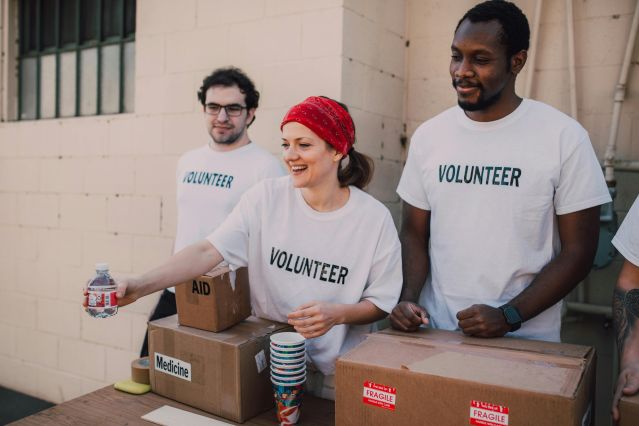Altruism
Want to Be Happy? Help Other People
The connection between altruism and well-being.
Posted June 5, 2024 Reviewed by Lybi Ma
Key points
- Why are we so bad at predicting what will make us happy?
- Our intuitions often lead us to believe that more material possessions will make us happier.
- Not all giving is created equal.
We all want to be happy. This is the driving force behind so much of what we do in life. But it’s not always intuitive what types of activities and situations lead to happiness. Predicting how we are going to feel in a given circumstance is what psychologists refer to as affective forecasting. All of us make such predictions every day without thinking, and it shapes how we prioritize our lives. Unfortunately, we are surprisingly poor judges of what makes us happy. This is one of the reasons why life is so complicated. We end up spending loads of time investing in pursuits that don’t necessarily lead to deep and enduring happiness.

As a case in point, if you were asked whether you would prefer to win the lottery or suffer a terrible accident that left you paraplegic, your answer would be obvious. Of course, you would be much happier as a lottery winner than an accident victim. Such a study was done, by the way. In the 1970s, Philip Brickman and his colleagues compared happiness and well-being between paraplegic accident victims and lottery winners. Surprisingly—and as a testament to our collective inability to predict how we will feel in a given situation—in terms of their abilities to enjoy everyday pleasures, there was no difference between the lottery winners and the accident victims. If anything, the lottery winners had a bit less ability to enjoy things (though this difference wasn’t statistically significant).
Why are we so bad at predicting what will make us happy?
Part of the answer is that our brains evolved in a time of relative scarcity. Because of this, our intuitions often lead us to believe that more material possessions (which, at one point in our distant past, helped us survive) will make us happier. We are psychologically wired to believe that if we can just obtain more material goods or get that promotion with higher pay, then we will finally be happy. But nature hasn’t prepared us to live in a time of relative abundance. We aren’t equipped with a psychological gauge that indicates when we have enough for our happiness.
As social philosopher Adam Smith rightly observed: “The desire for food is limited in every man by the narrow capacity of the human stomach; but the desire of the conveniences and ornaments of building, dress, equipage, and household furniture, seems to have no limit or certain boundary.”
Modern psychological studies have repeatedly made clear that, beyond having what is sufficient to meet our basic needs, more wealth does not lead to more happiness.
Here’s another example of how we’re bad at predicting what leads to happiness: a long list of experiments has shown that helping others leads to deep feelings of reward and satisfaction, sometimes more so than when we help ourselves. Yet most of us don’t walk around thinking: If I could only find more people to help today, then I could be happier. (Can you imagine how different the world would be if we intuitively realized that helping others will increase our happiness?) However, the evidence suggests that such thinking would be more psychologically accurate than the natural intuitions that we actually have.
Experiments confirm that altruism is rewarding
In one study published in the journal Science, university students were given some money in an envelope. Half of the students were instructed to spend the money on themselves—either on a bill, an expense, or a personal gift—by the end of the day. The other half were told to spend it on someone else or donate it to a charity. Surprisingly to most people (including the students themselves), those who spent the money on others were happier by the end of the day. Similar experiments have confirmed the finding that altruism is rewarding.
Encouragingly, the happiness-inducing characteristic of generosity may even be hard-wired into human nature. Evidence for this comes from the observation that this phenomenon seems to emerge quite early in childhood. Among toddlers younger than two years of age, those who give away treats are happier than those who receive treats. And, curiously, what researchers refer to as “costly giving” seems to lead to more happiness than non-costly giving. Giving away something that is yours (which requires sacrifice), as opposed to giving away something that isn’t yours, brings more emotional reward.

None of this is to say that we shouldn’t spend time on self-care. We all need time for relaxation and recreation. But if we’re not careful, our brains unwittingly lead us in the direction of over-investing in ourselves and our careers and under-investing in helping others—which can be a recipe for loneliness, and hence unhappiness.
If you’re considering enhancing your altruistic footprint to maximize your happiness, it’s important to note that not all giving is created equal.
Here are a few rules to keep in mind:
1. Unpaid service is generally more emotionally rewarding than if you are compensated for your time and labor. (Remember the finding that service that requires sacrifice is more rewarding than service that doesn’t.) Why is this the case? It seems that extrinsic rewards, such as money, can paradoxically undermine our intrinsic motivations and rewards for helping. Relatedly, being compensated for service may make the interaction more transactional and less about the goodwill of giving.
2. Begrudged service isn’t very rewarding. It could lead to resentment and, therefore, less happiness. This doesn’t mean it’s a bad idea to lovingly coax your teenage children into doing chores or volunteering at a rest home. It just means that they (and you) will maximize the emotional reward reaped from service by having a good attitude.
3. Face-to-face giving seems to be the gold standard. Serving others in a way you can interact with them and experience their gratitude produces more emotional rewards than virtual or anonymous service. This likely has to do with the fact that we evolved in relatively small, nonvirtual communities where face-to-face interactions were the norm. It’s not that virtual or anonymous types of service aren’t important, but if you’re trying to maximize the bang for your buck, try to find opportunities to help in your backyard.
4. To be happier, political activism (even if it’s unpaid) is not the same as helping others. Spending time in the service of a political cause is often a zero-sum game. When the side you’re on wins, it can be elating. But when you lose, you can be left with feelings of deep disappointment and nihilism. On top of this, as Arthur Brooks has noted, so much of modern political activism breeds deep feelings of “anger and contempt for people on the ‘wrong side’ of the issue.” These sorts of feelings can take a psychological toll on our happiness. This isn’t to say there aren’t important causes to rally behind. But if you spend all your discretionary time as an activist and none of it in other kinds of service, your mental health will suffer.
The next time you find yourself with some unexpected time that you’re not sure how to fill, remember that you’re not very good at predicting what will make you happy. Your brain will tell you that you should catch up on a work assignment, check your email, or engage in some other activity to “get ahead.” But if you want to maximize your happiness, try doing something for someone else.
Note: This post is adapted from Samual Wilkinson's book Purpose: What Evolution and Human Nature Imply About the Meaning of Our Existence. It also appears on Deseret News.
References
Brickman, P., Coates, D., & Janoff-Bulman, R. (1978). Lottery winners and accident victims: Is happiness relative?. Journal of personality and social psychology, 36(8), 917.
Dunn, E. W., Aknin, L. B., & Norton, M. I. (2008). Spending money on others promotes happiness. Science, 319(5870), 1687-1688.
Aknin, L. B., Hamlin, J. K., & Dunn, E. W. (2012). Giving leads to happiness in young children. PLoS one, 7(6), e39211.
Brooks, Arthur C. "How to Build a Life: Choose the Activism That Won’t Make You Miserable." The Atlantic (May 11, 2023).




